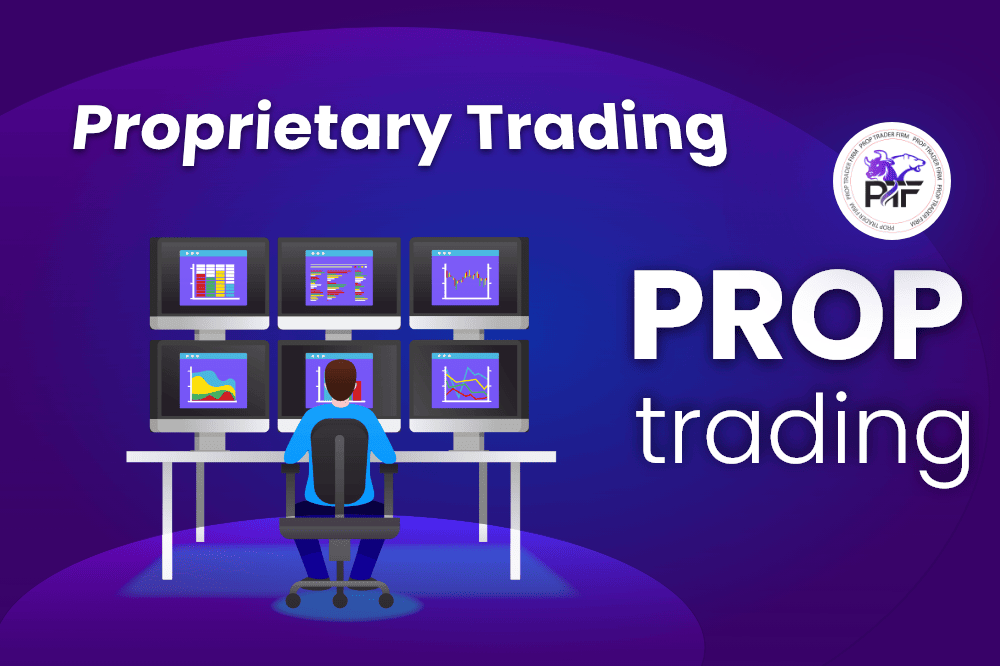
Table of Contents
Introduction
What is Proprietary Trading?
The Basics of Proprietary Trading
How Proprietary Trading Works
Types of Proprietary Trading Firms
Advantages of Proprietary Trading
Risks Associated with Proprietary Trading
How to Get Started with Proprietary Trading
Choosing the Right Proprietary Trading Firm
Tips for Success in Proprietary Trading
Conclusion
FAQs
1. Introduction
In this blog post, we will explore the concept of proprietary trading, also known as prop trading. We will begin by providing a simple explanation of what proprietary trading is, using layman's language. Then, we will delve into how proprietary trading is conducted and discuss the companies that offer prop trading accounts.
2. What is Proprietary Trading?
Proprietary trading refers to the practice of trading financial instruments, such as stocks, bonds, commodities, or currencies, using a firm's own capital. In simpler terms, it involves a company using its own money to make investments in various financial markets with the goal of generating profits.
3. The Basics of Proprietary Trading
Proprietary trading is different from traditional trading, where individuals or institutions trade with their own personal funds or on behalf of clients. In prop trading, the firm takes on the risk and rewards of the trading activities. It requires a deep understanding of the financial markets, analysis of market trends, and the ability to make informed decisions to maximize profits.
4. How Proprietary Trading Works
Proprietary trading firms hire skilled traders who have expertise in specific financial markets. These traders use advanced trading strategies and tools to identify profitable opportunities. They closely monitor market conditions, analyze price movements, and execute trades based on their analysis. Proprietary traders may employ various trading techniques, such as scalping, day trading, or swing trading, depending on their trading style and market conditions.
5. Types of Proprietary Trading Firms
There are different types of proprietary trading firms, ranging from small boutique firms to large financial institutions. Some firms focus on a specific asset class, such as stocks or commodities, while others may trade across multiple markets. Proprietary trading firms may also specialize in certain trading strategies or use automated trading systems to execute trades.
6. Advantages of Proprietary Trading
Proprietary trading offers several advantages, both for the trading firm and the individual traders. For the firm, prop trading can be a lucrative source of profits, as successful trading activities can generate substantial returns. It also allows firms to attract top trading talent and diversify their revenue streams. For individual traders, prop trading provides an opportunity to leverage the firm's capital, access advanced trading tools and technologies, and learn from experienced traders.
7. Risks Associated with Proprietary Trading
While proprietary trading can be profitable, it is not without risks. The financial markets are inherently volatile, and traders must be prepared for potential losses. Proprietary trading firms face market risk, liquidity risk, and regulatory risk. Traders need to manage risk effectively by implementing risk management strategies, using stop-loss orders, and diversifying their trading activities.
8. How to Get Started with Proprietary Trading
To get started with proprietary trading, individuals need to gain a solid understanding of the financial markets and develop trading skills. It is essential to have a good grasp of technical analysis, fundamental analysis, and risk management principles. Aspiring prop traders can seek educational resources, attend trading courses, and practice trading in simulated environments before trading with real money.
9. Choosing the Right Proprietary Trading Firm
When choosing a proprietary trading firm, it is crucial to consider factors such as the firm's reputation, trading platform, commission structure, capital requirements, and support provided to traders. Researching and comparing different firms can help individuals find the right fit based on their trading goals, preferences, and level of experience.
10. Tips for Success in Proprietary Trading
To succeed in proprietary trading, traders should focus on continuous learning and improvement. They should stay updated with market news, economic indicators, and trading strategies. Developing a trading plan, setting realistic goals, and maintaining discipline are essential. It is also crucial to manage emotions, avoid overtrading, and adhere to risk management principles.
11. Conclusion
Proprietary trading is a fascinating field that offers individuals and firms the opportunity to generate profits by trading financial instruments using their own capital. While it comes with risks, with the right knowledge, skills, and strategies, it can be a rewarding endeavor. Aspiring prop traders should carefully research and choose the right proprietary trading firm, continuously educate themselves, and develop sound trading techniques to increase their chances of success.
1. Is proprietary trading only for large financial institutions?
No, proprietary trading is not limited to large financial institutions. There are proprietary trading firms of various sizes, including small boutique firms that specialize in specific markets or strategies.
2. Can individuals participate in proprietary trading?
Yes, individuals can participate in proprietary trading by joining proprietary trading firms. These firms provide access to trading capital, advanced tools, and support for individual traders.
3. Do proprietary trading firms guarantee profits?
No, proprietary trading firms do not guarantee profits. Trading in financial markets involves risks, and profits are not guaranteed. Traders must have the skills, knowledge, and experience to make informed trading decisions.
4. Are there any costs involved in joining a proprietary trading firm?
Some proprietary trading firms may require traders to contribute their own capital or charge fees for training, access to trading platforms, or other services. The costs and arrangements can vary between firms, so it is important to thoroughly research before joining.
5. Will prop firms last?
A: Prop firms are likely to continue existing, but their longevity depends on various factors such as market conditions and their ability to adapt.
6. Do prop firms use real money?
A: Yes, prop firms typically use real money for trading to provide traders with a realistic experience.